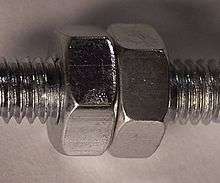Jam nut

A jam nut is a low profile type of nut, typically half as tall as a standard nut. It is commonly used as a type of locknut, where it is "jammed" up against a standard nut to lock the two in place. It is also used in situations where a standard nut would not fit.
The term "jam nut" can also refer to any nut that is used in the same function (even a regular-thickness nut used for the jamming purpose). Jam nuts, other types of locknuts, lock washers, and thread-locking fluid are ways to prevent vibration from loosening a bolted joint.
Use
A jam nut is often used when a nut needs to be locked in place without clamping against another object. The jam nut essentially acts as the "other object", as the two nuts are tightened against each other. They can also be used to secure an item on a fastener without applying force to that object. This is achieved by first tightening one of the nuts onto the item. Then the other nut is screwed down on top of the first nut. The inner nut is then slackened back and tightened against the outer nut.
Jam nuts can also be used in situations where a threaded rod must be rotated. Since threaded rods have no bolt heads, it is difficult or impossible to apply torque to a threaded rod. A pair of jam nuts is used to create a point where a wrench may be used.
Jam nuts can be unreliable under significant loads. If the inner nut is torqued more than the outer nut, the outer nut may yield. If the outer nut is torqued more than the inner nut, the inner nut may loosen up.[1][2]
References
- ↑ Barrett, Rich. "Fastener Design Manual". Retrieved March 20, 2009.
- ↑ "The Use of Two Nuts to Prevent Self Loosening". Retrieved May 18, 2014.